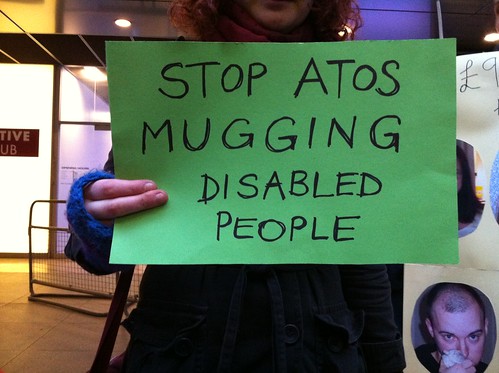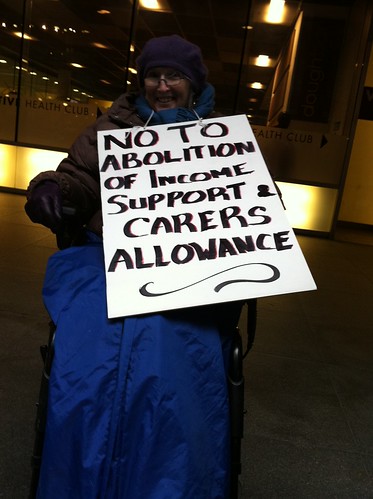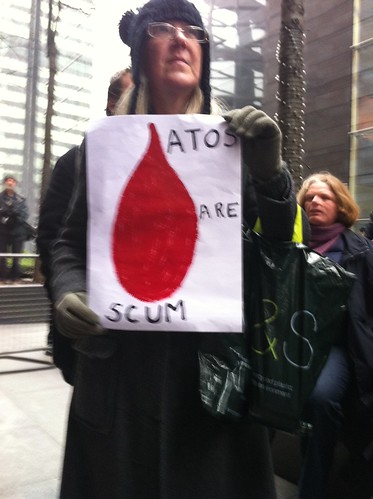It’s Sunday! We’re all exhausted, but the response to
“One Month Before Heartbreak” (OMBH) has been astonishing. I don’t think there’s a blog or charity website or anti-cuts group that haven’t posted a link to one of our stories, or written about the impending DLA cuts.
One month before Heartbreak has achieved great, great things. Tens of thousands of people have read our stories, and not just other disabled people, but across the entire web, In my own bizarre and ever entertaining stats, I have been randomly taken to heart by a tattoo site, a knitting site, a forum for discussing films and a group of football fans.
But still no politicians.
Every day, we write. We tweet, we phone, we sign petitions and using our weapon-words, we plead with them to get in touch. I speak for myself, but not one has yet replied.
Labour bought in the terrifying Employment Support Allowance with its demeaning assessments and its “unfit for purpose” design. Now the Conservative led coalition will abolish Disability Living Allowance altogether too, replacing it with “PIPs” and reducing the eligibility by up to 25% along the way. I can’t think of a corner of our lives they’re leaving alone, with changes to work programmes, eligibility, housing entitlement, care packages, work guidelines, education provision and hospital care. Yet the opposition say nothing. When the ESA changes were first announced in the CSR, time limiting ESA to one year in the grossest act of betrayal I can remember from any government, it was the only policy area that Labour felt comfortable to immediately support. Douglas Alexander said this in his response,
"Pathways to Work, using the private and voluntary sector to provide back to work support, with payment by results...and proposals such as; reforming the DLA gateway, continuing the IB to ESA transition and continuing to drive down fraud (and).... a role for private and voluntary providers. Funding based on outcomes not processes..... Virtually everyone on benefits should be on an active journey towards work."
(Full analysis
here)
The other, Lib Dem, Alexander, Orange Danny, used to be a fierce advocate of the sick and disabled.
"The Scottish Secretary has warned hundreds of thousands of sick people may be wrongly forced back to work under reforms designed to reduce Britain’s £171 billion annual welfare bill.
Danny Alexander also claimed the benefits system may be brought “close to meltdown” by tens of thousands appealing rulings they are no longer eligible for state support.
Although his comments were made before the general election, sources close to Mr Alexander said that he remains concerned and would be lobbying Cabinet colleagues”
(From
The Telegraph)
Sadly, that would be just before he got that top treasury job slashing those very same benefits still further. Not a peep since.
And Mr Cameron. We really thought he would understand. He has genuine experience of profound disability and all the challenges and extra pressures it involves. When he gave this interview to the Independent in 2009, it was clear he knew exactly what was wrong with the system and he pledges to change it in ways that sick and disabled people found quite impressive.
“The second lesson was that life for parents of disabled children is complicated enough without having to jump through hundreds of government hoops. After the initial shock of diagnosis you're plunged into a world of bureaucratic pain. Having your child assessed and getting the help you're entitled to means answering the same questions over and over again, being buried under snow drifts of forms, spending hours on hold in the phone queue.
I am determined to make life simpler for parents. One option we're looking at is inspired by something they're doing in Austria. There a crack team of medical experts – doctor, nurse, physio – act as a one-stop-shop to assess families and get them the help they need.....
.....Because we can never forget what an amazing job they do. Just consider what it would mean if the army of parents and carers in this country gave up, packed up, said they couldn't cope any more. The financial cost of looking after those children would be immense”
(From
The Independent)
Reading that article now is shameful, every promise, every insight forgotten the minute that key to No.10 finally fell into his hands.
“But why?” you ask. “Why do they all treat you this way?”
Well, the entire system is based on two flawed assumptions. In the 80s, with unemployment spiralling out of control, Maggie needed a way to massage the figures. In no time at all, the figures of people claiming Incapacity Benefit (now ESA) more than trebled from around 700,000 to 2.5 Million. It went “under the radar” if people were declared unfit for work instead of claiming unemployment benefit.
During the entire period Labour was in office, the figure barely changed, hovering around that two and a half million mark. “Eureka!” Exclaimed James Purnell, uber-Blairite, and the succession of clones that followed him “They can all work! They were never sick in the first place!”
Sadly, it never seems to have occurred to his reformist mind that the NHS circa 1985 is a very different place to the NHS of 2011. Survival rates for serious illness have soared, medication has been revolutionised compared with over 3 decades ago. Children born prematurely survive earlier and earlier with all the complications that can sometimes involve. Surgical procedures are unrecognisable with new ways of treating conditions discovered almost daily. Gradually, Maggie’s forgotten 1.75 million found jobs or died and were replaced by new claimants, the miracle by-products of a medical revolution. The tests are now so tough to claim sickness or disability support, the forms so arduous the checks so rigorous, that fraud is actually remarkably low – less than 1% according the DWP’s own figures.
The other flawed assumption, is that we don’t want to work, we need urging and coercing. Well, we do want to work. For most of us, the day we had to give up our ambitions and dreams was the worst of our lives.
There are schemes that can help. I’ll be talking about them at length on
my own blog, over the coming weeks before “Heartbreak”, but on the whole, politicians show a breathtaking lack of understanding about illness and disability. They only ever really mention those with physical impairments such as blindness and paraplegia. They never consider how one might possible hold down a job with the symptoms of a full blown illness or a devastating mental condition. More to the point, they never consider who will employ us! With our vomit bowls and syringes and blackouts and seizures, do they really think an army of employers are just waiting to take us eagerly into the workplace?
Still no matter.
Every last scrap of evidence shows that their schemes are unfit for purpose, that ESA and DLA reform are causing considerable distress, that “assessors” aren’t qualified to make decisions about who can and can’t work with 35% of decisions going to appeal and around 70% of those appeals being upheld.
But at a time when unemployment is creeping towards 3 million, let’s press ahead with making 2.3 million of the 2.6 million (91%!!!) who claim ESA unemployed too! And hang it, let’s add 750,000 or so of the most profoundly ill too, by “assessing” DLA all over again.
They can’t do much about it, after all.
But, as
OMBH has shown, we can. And this time, we will.









